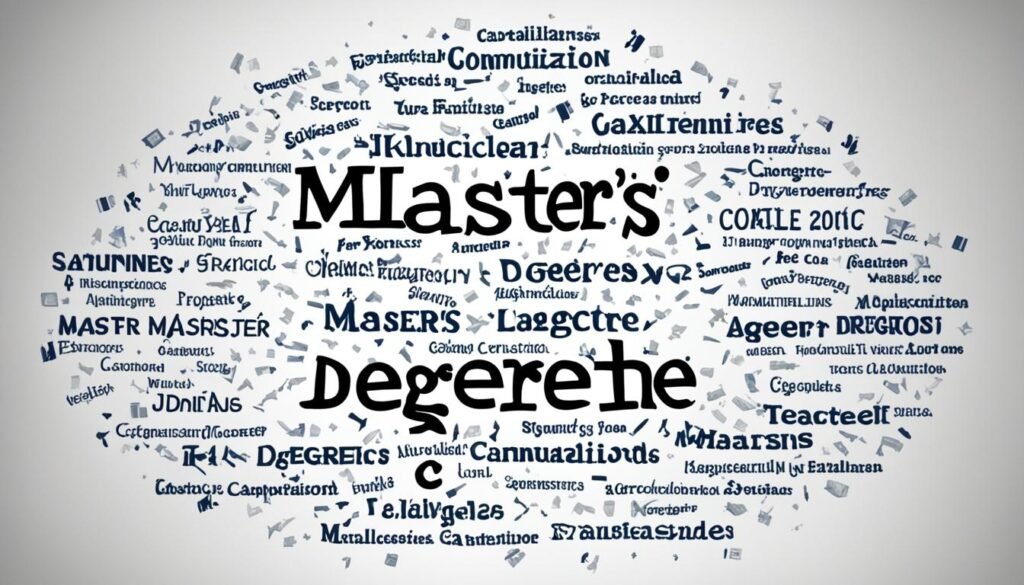When it comes to spelling, we often assume we know the rules. But did you know that the correct spelling of “master’s degree” actually includes an apostrophe? That’s right! The apostrophe indicates a possessive, showing that the degree belongs to a master. The same rule applies to “bachelor’s degree.” It’s a small detail that can make a big difference in the accuracy of your writing.
When referring to a specific degree, it’s important to capitalize “master” or “bachelor” and the field of study, such as “Master of Science.” The use of abbreviations for these degrees may vary depending on the university and style guide. The bottom line is, getting the spelling and capitalization of “master’s degree” right shows professionalism and attention to detail.
Key Takeaways:
- The correct spelling of “master’s degree” includes an apostrophe.
- Capitalization rules differ depending on the context.
- When referring to a specific degree, capitalize “master” or “bachelor” and the field of study.
- Pay attention to the use of abbreviations for academic degrees.
- Accurate spelling and capitalization demonstrate professionalism and attention to detail.
Spelling and Capitalization of Master’s Degree
When it comes to discussing academic degrees, it is essential to pay attention to both spelling and capitalization. In this section, we will explore the correct way to spell “master’s degree” and “bachelor’s degree” and understand when capitalization is necessary.
To indicate possession, “master’s degree” and “bachelor’s degree” should always include an apostrophe. This demonstrates that the degree belongs to a master or a bachelor. However, it is important to note that the apostrophe should not be used in the plural form when referring to multiple individuals with these degrees.
In terms of capitalization, the rules vary depending on the context. When using the terms “master’s degree” and “bachelor’s degree” in a general sense, they do not need to be capitalized. However, when they form part of a proper title or are referring to a specific field of study, capitalization is necessary.
For example, if someone has earned a “Master of Arts” or a “Bachelor of Science” degree, the terms “master” and “bachelor” should be capitalized. This applies to both the full name of the degree and its abbreviation. In contrast, when using these terms in a more general sense, such as “She has a master’s degree in psychology,” the words do not need to be capitalized.
It is important to remember that the abbreviations for these degrees may vary. For instance, a “Master of Science” degree may be abbreviated as “M.S.,” but in other cases, it could be “M.Sc.” or “MS.” When using abbreviations, it is essential to ensure consistency and follow the appropriate style guide or university guidelines.
The Importance of Consistent Spelling and Capitalization
Consistency in spelling and capitalization of academic degrees is crucial for maintaining professionalism and clarity in your writing. By adhering to the correct rules, you enhance the credibility of your work and demonstrate a strong attention to detail.
When drafting academic documents, such as research papers, theses, or resumes, it is always a good practice to consult the style guide recommended by your institution or field. This will provide you with specific guidelines regarding the spelling and capitalization of various degrees.
Remember that accuracy in spelling and appropriate capitalization will help highlight your professional competence and attention to detail. By following these guidelines, you can ensure that your writing aligns with the expectations of the academic community.

Proper Usage and Formatting of Academic Degrees
In the realm of academia, it is important to understand the proper usage and formatting of academic degrees. While not all degrees require capitalization, their specific names, such as “Bachelor of Arts” or “Master of Social Work,” should always be capitalized. When using general references like “bachelor’s degree,” “master’s degree,” or “doctoral degree,” capitalization is not necessary.
The possessive form of “bachelor’s degree” and “master’s degree” should include an apostrophe, indicating that the degrees belong to a bachelor or a master. This simple punctuation mark ensures grammatical correctness and clarity in expressing ownership.
Abbreviations are commonly used to represent academic degrees, such as B.A., M.S., or Ph.D. When utilizing them in your text, it is important to ensure their appropriateness. However, when referring to an alumnus or an alumna, their preferred class year is usually used instead of the degree abbreviation.
When listing degrees earned at other institutions, it is crucial not to mix them with degrees earned at your current institution, such as WMU. This clear separation prevents confusion and maintains accuracy when presenting one’s academic achievements.
Source Links
- https://www.grammarly.com/blog/masters-degree/
- https://wmich.edu/writing/rules/degrees
- https://www.grammarbook.com/blog/apostrophes/masters-degree/


